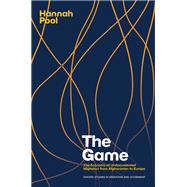The Game The Economy of Undocumented Migration from Afghanistan to Europe
, by Pool, Hannah- ISBN: 9780197812273 | 0197812279
- Cover: Hardcover
- Copyright: 6/18/2025
To seek asylum, people often have to cross borders undocumented, embarking on perilous trajectories. Due to the war in Afghanistan, the rule of the Taliban, and severe human rights violations, over the past decades thousands of people have risked their lives to seek safety. By what means do they make these journeys, especially when they lack money and passports?
Over the course of three years, Hannah Pool accompanied a group of Afghan friends and families as they attempted "The Game" - Game zadan: the route to Europe to seek asylum. The resulting ethnography follows them across their entire trajectories: through Iran, Turkey, Greece, and along the so-called Balkan route. In each place, Pool details the economic interactions and social relationships essential for acquiring, saving, borrowing, spending, and exchanging money to facilitate their undocumented migration routes.
The Game bridges economic sociology and migration studies to illustrate how migrants decide to trust people to facilitate their movement along these routes, focusing particularly on debt, special monies, bribes, donations, and gift-giving. Throughout the migration trajectory, relationships with family, fellow migrants, smugglers, humanitarian actors, and border control officials shape and are shaped by access to financial resources.
Ultimately, the book highlights the dangers in undocumented border-crossing and delves into the core of what it means to flee: Who has the means to escape dangerous conditions to seek asylum?
Over the course of three years, Hannah Pool accompanied a group of Afghan friends and families as they attempted "The Game" - Game zadan: the route to Europe to seek asylum. The resulting ethnography follows them across their entire trajectories: through Iran, Turkey, Greece, and along the so-called Balkan route. In each place, Pool details the economic interactions and social relationships essential for acquiring, saving, borrowing, spending, and exchanging money to facilitate their undocumented migration routes.
The Game bridges economic sociology and migration studies to illustrate how migrants decide to trust people to facilitate their movement along these routes, focusing particularly on debt, special monies, bribes, donations, and gift-giving. Throughout the migration trajectory, relationships with family, fellow migrants, smugglers, humanitarian actors, and border control officials shape and are shaped by access to financial resources.
Ultimately, the book highlights the dangers in undocumented border-crossing and delves into the core of what it means to flee: Who has the means to escape dangerous conditions to seek asylum?






